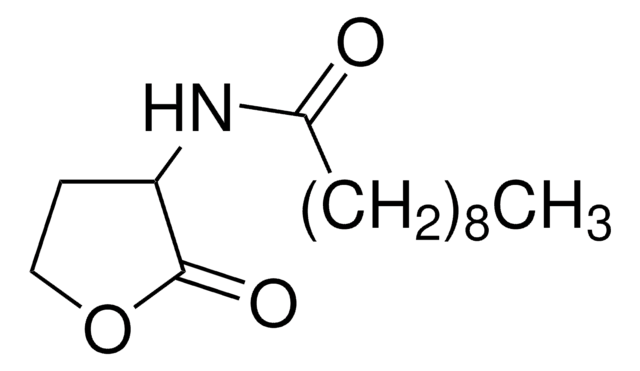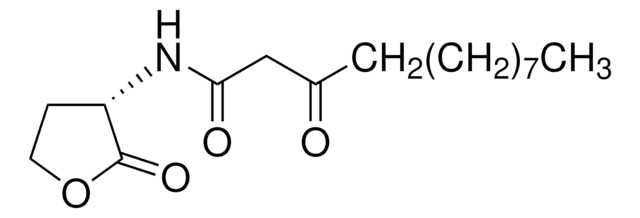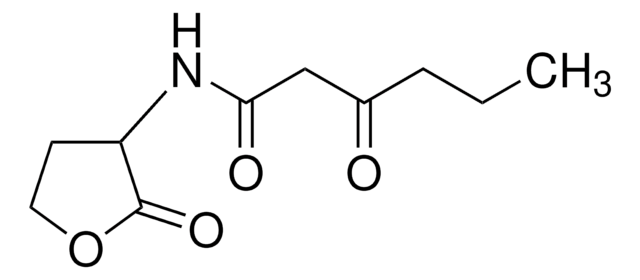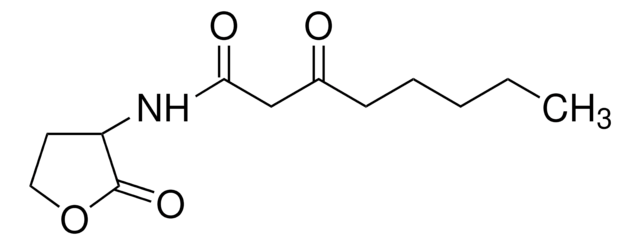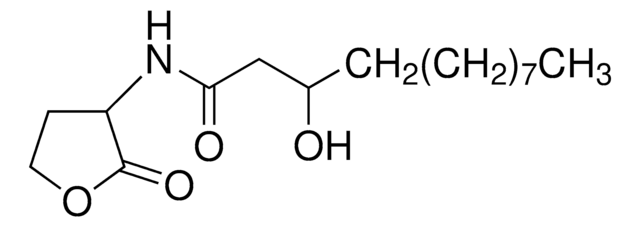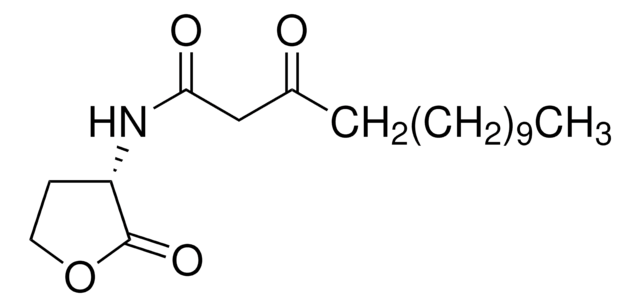09926
N-Hexanoyl-DL-homoserine lactone
≥97.0% (HPLC)
Synonym(s):
N-Caproyl-DL-homoserine lactone
Sign Into View Organizational & Contract Pricing
All Photos(1)
About This Item
Empirical Formula (Hill Notation):
C10H17NO3
CAS Number:
Molecular Weight:
199.25
Beilstein:
1640340
MDL number:
UNSPSC Code:
12352209
eCl@ss:
32160406
PubChem Substance ID:
NACRES:
NA.26
Recommended Products
Assay
≥97.0% (HPLC)
form
powder or crystals
technique(s)
LC/MS: suitable
color
white to faint beige
mp
101-106 °C
storage temp.
2-8°C
SMILES string
CCCCCC(=O)NC1CCOC1=O
InChI
1S/C10H17NO3/c1-2-3-4-5-9(12)11-8-6-7-14-10(8)13/h8H,2-7H2,1H3,(H,11,12)
InChI key
ZJFKKPDLNLCPNP-UHFFFAOYSA-N
Related Categories
Application
Induces violacein expression in a Chromobacterium violaceum mutant usually not able to produce homoserine lactones.
Biochem/physiol Actions
N-Hexanoyl-DL-homoserine lactone is a member of N-acyl-homoserine lactone family. N-acylhomoserine lactones (AHL) regulate gene expression in gram-negative bacteria, such as Echerichia and Salmonella and are involved in quorum sensing, cell to cell communication among bacteria. Some AHLs are potent chemoattractants for human immune cells such as neutrophils.
Quorum-sensing signal generation
Storage Class Code
11 - Combustible Solids
WGK
WGK 3
Flash Point(F)
Not applicable
Flash Point(C)
Not applicable
Personal Protective Equipment
dust mask type N95 (US), Eyeshields, Gloves
Certificates of Analysis (COA)
Search for Certificates of Analysis (COA) by entering the products Lot/Batch Number. Lot and Batch Numbers can be found on a product’s label following the words ‘Lot’ or ‘Batch’.
Already Own This Product?
Find documentation for the products that you have recently purchased in the Document Library.
Customers Also Viewed
Albert Soler et al.
International journal of environmental research and public health, 15(5) (2018-05-23)
Quorum sensing (QS) is a mechanism dependent on bacterial density. This coordinated process is mediated by the synthesis and the secretion of signal molecules, called autoinducers (AIs). N-acyl-homoserine lactones (AHLs) are the most common AIs that are used by Gram-negative
Daniel Wynn et al.
The Analyst, 143(19), 4774-4782 (2018-09-15)
There are an estimated 48 million cases of foodborne illness in the United States every year. In general, these illnesses are the result of unintentional contamination and improper food handling. Because bacterial contamination plays a major role in food spoilage
Tomohiro Morohoshi et al.
FEMS microbiology letters, 279(1), 124-130 (2008-01-08)
In tests, Chromobacterium violaceum ATCC 12472 produced several N-acyl-L-homoserine lactones (AHLs). Of these, N-(3-hydroxydecanoyl)-L-homoserine lactone was dominant, and controlled violacein production by quorum sensing. Strain VIR07, an AHL-deficient mutant, did not produce violacein. Violacein production in VIR07 was induced by
Robert Czajkowski et al.
Acta biochimica Polonica, 56(1), 1-16 (2009-03-17)
Many Gram-positive and Gram-negative bacteria communicate using small diffusible signal molecules called autoinducers. This process, known as quorum sensing (QS), links cell density to the expression of genes as diverse as those associated with virulence factors production of plant and
L Eberl
Systematic and applied microbiology, 22(4), 493-506 (2000-05-04)
The view of bacteria as unicellular organisms has strong roots in the tradition of culturing bacteria in liquid media. However, in nature microbial activity is mainly associated with surfaces where bacteria form highly structured and cooperative consortia which are commonly
Our team of scientists has experience in all areas of research including Life Science, Material Science, Chemical Synthesis, Chromatography, Analytical and many others.
Contact Technical Service


